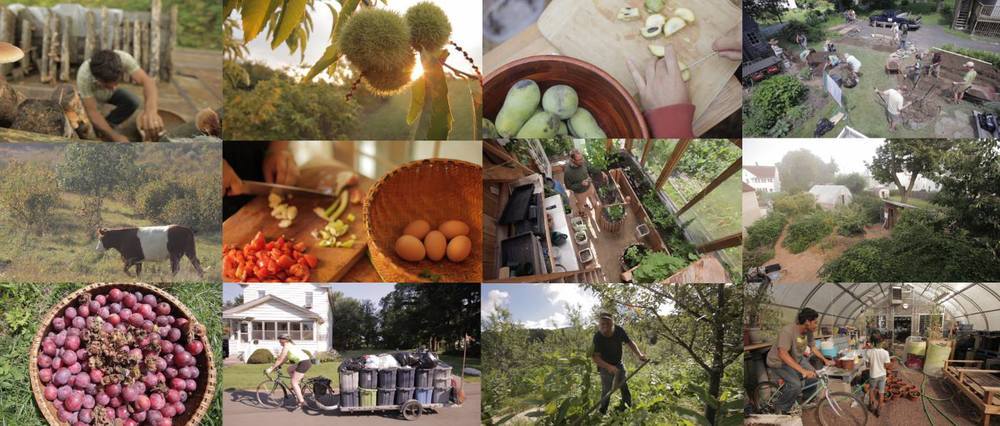
“All we need to live a good life surrounds us. Sun, wind, people, buildings, stones, sea, birds, and plants. Cooperation with all these things brings harmony, opposition to them brings disaster and chaos.” – Bill Mollison, co-founder of Permaculture
The award-winning 2015 documentary film Inhabit – A Permaculture Perspective opens with this quote before it takes viewers on an incredible journey across the American landscape, from the blades of a combine swallowing up corn in the Midwest to the hidden rooftop gardens of New York City. The film explores the increasingly exigent issue of how humans can live more in harmony with the natural world, especially in a time of rapid global industrialization–a question central to our fate and that of our planet.
“Inhabit,” from the Latin, means to dwell, which is what Permaculture is all about. The term Permaculture was coined in the 1970s as a portmanteau of “permanent agriculture” to propose a sustainable alternative to industrialized farming. Permaculture asks us to think of ourselves as part of nature, rather than as dominating over it, to work with nature’s processes instead of against them. Equally important then in Permaculture is the idea of transforming our entire culture permanently to embrace sustainable practices.
On September 8th, a screening of the film at the Graduate Center was followed by a Q&A with the director, cinematographer, and editor Costa Boutsikaris. Boutsikaris devoted several years to the film, using funds donated entirely on Kickstarter. He applied the principles of Permaculture to the production itself, retrofitting a van to run on waste vegetable oil and procuring a solar panel for camera charging and film editing on the road. Also joining the Q&A was Andrew Faust, one of the foremost designers of Permaculture featured in the film. Faust teaches at The Center for Bioregional Living where he blends philosophy with science and practical design.
The film has been screened at numerous festivals and won several awards. This screening was the inaugural fall 2016 event of the Ecocriticism Seminar, a student group that was formed to bring together scholars working across the environmental humanities at The Graduate Center, CUNY and in New York City. The film was shown in partnership with the Environmental Education Fund, which helps to host environmental films across various organizations.
This beautifully rendered film, with an original score by Aled Roberts, surveys a wide range of Permaculture practices: rural, suburban, urban; individuals, families, neighborhoods; small and large farms, vegetarian farms and animal farms. Among the 20 Permaculture practitioners featured, each story is unique but equally inspiring. In the film, we meet residents of Camden, New Jersey, whose neighborhood is polluted by the nearby water treatment plant as they turn an abandoned lot into a rain garden lush with life. We meet Pandora Thomas, who runs Pathways to Resilience, which teaches Permaculture design to men coming out of incarceration in the Bay Area. Thomas applies the first principle of Permaculture, the concept of “observing and interacting” with the environment, to her philosophy of community building, leading her to “create capacity for people’s needs to be heard,” she says.
“I can give back now. I have children that could actually learn from me,” explains Pathways to Resilience participant Anthony Forrest. Permaculture promotes holistic transformations, not just of the land, but of the soul, of community, of culture itself.
Permaculture and urban living are not mutually exclusive; the movement is founded on a set of principles that can be applied anywhere, by anyone. Audience questions centered around ways to get involved with Permaculture in New York City (see the resources listed below). One audience member raised the concern that Permaculture could become just another fad for the wealthy foodie crowd, but both Boutsikaris and Faust stressed Permaculture’s openness across socioeconomic strata and cultures, as well as its origins in and work with indigenous cultures.
“Permaculture is a way of thinking, … a way of seeing ourselves as biological organisms who are deeply rooted in the life-matrix of planet earth,” says Faust in The Evolution of Ecological Consciousness.
In a time when human impact has become so destructive, what hope can we have? Most contemporary environmentalism is focused on lowering human impact rather than transforming it. Permaculture attempts to flip this script. For Permaculture designer Ben Falk, founder of Whole Systems Design, who was featured in the film, the principles of Permaculture allow us to transform our surroundings in a way that is mutually beneficial to humanity and the broader ecosystem. “Then impact becomes a great thing,” he says. “Footprint is something we want to leave.”
—
This event was presented as part of the Ecocriticism Seminar, a student-led Working Group. Working Groups provide the institutional support necessary for students and faculty to develop and implement interdisciplinary projects. For more information or to join, email [email protected].
Additional Resources:
http://www.permaculturenewyork.com